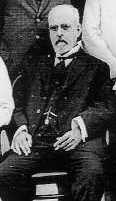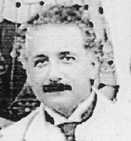
|
home |
|
Einstein in Singapore by Joan Bieder On November 2, 1922, the Japanese mail steamer Kitano Maru arrived in Singapore harbor carrying a famous passenger. Professor Albert Einstein disembarked that Thursday morning with his wife Elsa. The mission in Singapore was not Einstein's first fundraising effort, but it was one of the few he made on his own. The reasons for Einstein's visit had much to do with the fact that he was famous, less to do with his science, and everything to do with the fact that he was Jewish. Einstein joined the Zionist cause in 1919, passionately believing in the creation of the Hebrew University in Jerusalem. He envisioned an academically elite institution, one that would operate autonomously, based solely on research and teaching, and dedicated to training Jewish students with the highest scientific and academic standards.
There is no evidence that Einstein kept a personal diary, but he often jotted down impressions when traveling abroad, and the entries regarding his visit to Singapore are relatively long and detailed. They reveal his commitment to education, his attention to detail, a sense of humor, and a lack of pretension. Einstein described his arrival and reception in Singapore: "Arrived in Singapore. through narrow passages between small green islands. There we were met and friendly greeted by Zionists." The Straits Times, Singapore's daily English-language newspaper, reported that the "great scientist and his wife were welcomed by leading members of the local Jewish community." A day later, a follow-up article said that practically the entire Jewish community met Einstein at the ship. The 1921 census reports the Jewish population of Singapore at 623. 
Einstein's hosts were Mr. and Mrs. Alfred Montor, the former a diamond merchant in Singapore. Montor was of German origin and could easily converse with Einstein in his native language. A few days before the Kitano Maru docked in Singapore, The Straits Times published an announcement inviting the Singapore Jewish community to an "At Home'' at Sir Menasseh Meyer's residence in honor of Albert Einstein. Meyer was a very rich merchant, an Orthodox Jew of Baghdadi origins, who had made his fortune in the opium trade and through vast real estate holdings and who would become the primary target of Einstein's fundraising efforts. Meyer's wealth evidently made an impression on Einstein. Throughout his notes, Einstein referred to Menasseh Meyer as Croesus, the legendary 5th-century king of Lydia renown for his vast wealth. He described Meyer's home "like a palace, with Moorish charming halls. Located on the top of a hill with a view of the city and the sea. Directly below it is a magnificent synagogue which was actually built for the purpose of communication between Croesus and Jehovah." But Einstein focused more on the physical characteristics of Meyer, seeking insights into his character: 
"Croesus is still a slender, upright eighty year old man [Meyer was actually 75 or 76] with a strong will. A small gray pointed beard, a think reddish face, a narrow Jewish bent nose, clever, somewhat shrewd eyes, a small black cap on a well-arched forehead. Resembling Lorentz [a reference to Einstein's friend and mentor, the well-known physicist Henri A. Lorentz], yet the shining benevolent eyes of the latter are replaced by guarded sly ones, and the facial statement reflects more schematic order and work, rather than love for mankind and solidarity as in Lorentz's case." The scrutiny of Meyer's eyes demonstrated Einstein's natural tendency to careful observation, and perhaps he was searching for a hint as to whether his plea for funds would succeed. Einstein wrote that "this was the stronghold in which, according to [Chaim] Weizmann's plan, I should have derived a benefit for the University of Jerusalem."
In October 1922, Chaim Weizmann, head of the World Zionist Organization, had sent the following telegram from London to the Zionist Society in Singapore: "Professor Einstein and wife arrive Singapore November first Kitano Maru. Kindly arrange reception their honor. Celebrate event by raising a big contribution to Jerusalem University." The Straits Times noted that at the reception, "All communities and creeds were represented," while Einstein recorded other particulars of the event, including that the "Archbishop was an English-only speaking, slim, large nosed English nobleman. He had his eye, not without success, on Croesus' money, without in the least making a claim on his soul." Apparently, few at the event spoke German or French, the two languages Einstein spoke well, and he reports that the afternoon was a "desperate calamity of language with good tasting cake." Einstein and Meyer sat on two raised chairs behind a speaker's table. Montor delivered his address in English: "We deem it a high honor to receive you, not only as a son of our ancient race, but also as one whose mind has soared beyond the range and placed you among men like Democritus, Galileo and Newton." Einstein spoke in German, translated into English by Montor:
Einstein continued: "We need to do this all the more on account of the present political developments and especially in the view of the fact that a large percentage of our sons are refused admission to the Universities of other nations." The audience reacted with cries of shame. Einstein referred to the practice of numerus clausus or numerus nullus, imposing quotas on the number of Jewish students at certain European universities or excluding them completely from certain fields of study. Einstein noted that he saw "true warmth among Jews everywhere." After a brief stop at the Montors' home, they attended a "pompous meal in an open hall for about 80 people." He also recorded that he "finally" asked Meyer directly to contribute money to Hebrew University, but "despite my many efforts, I do not know if one of my missiles could penetrate the thick skin of Croesus." One week after his visit to Singapore, Einstein was awarded the Noble Prize in Physics. A few months later, Einstein later learned that his pleas to Menasseh Meyer had not been in vain. In January 1923, after a successful lecture tour in Japan, the Einsteins returned to Singapore for an informal visit on their way to Palestine. During that same week, the Palestine Weekly reported that Menasseh Meyer had contributed 500 British pounds and the Jewish community of Singapore 250 British pounds to help build Hebrew University, a handsome sum in 1922.
Joan Bieder is a senior lecturer at the Graduate School of Journalism at UC Berkeley. A former producer for ABC-TV Network News, she taught journalism at Columbia University before going to Berkeley. She frequently spends the summer in Singapore, consulting with television news divisions there, and has recently completed her research project, "The Significance and the Disappearance of the Jews of Singapore." Professor Hanoch Gutfreund, who translated Einstein's diary entries, is the former President of the Hebrew University of Jerusalem, where he holds the Andre Aisenstadt Chair in Theoretical Physics. A version of this essay appeared in Fables magazine in April 2000. Images courtesy of Alan Frankel.
| click on image details | ||||||||||||||||||||||





